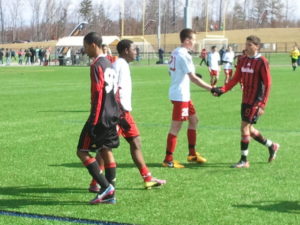Part 2: Should we teach gamesmanship in youth soccer?
 Editor’s note: This is the continuation of John’s post earlier this month, where he discusses the complex issues that unfold from one fundamental question about gamesmanship: “What should we be teaching our young players about these situations where breaking the rules led to great success and minimal punishment for the offender?”
Editor’s note: This is the continuation of John’s post earlier this month, where he discusses the complex issues that unfold from one fundamental question about gamesmanship: “What should we be teaching our young players about these situations where breaking the rules led to great success and minimal punishment for the offender?”
I realize that writers are supposed to provide answers, and I have asked a lot more questions then I answered in Part 1. But the point of this article was to make you think about a scenario that for many people is not black and white. I certainly have had to do a lot of thinking to write this.

As I said above, I certainly introduced gamesmanship to my players when I coached. Yet now, as a much more experienced coach, my heart tells me I was not right, that many times I was focused on outcomes and not process.
I now believe that it is possible to prepare players for higher level sports AND prepare them to be good people. This third path starts with our entire approach to youth sports.
Dr. Ron Quinn (pictured at right), a professor of Sports Ethics at Xavier University and a man known to many for his work in U.S. soccer, says this:
“Young players play with a great deal of fairness and sportsmanship. Once they learn how important the game is to adults, they will learn how to cheat.”
Perhaps our answer lies not in whether we should teach gamesmanship or not, but whether we should be so focused on winning during our players’ developmental years that we feel a need to even ask such a question!
What if winning was less important to us adults? What if our child’s development, improvement, level of enjoyment and effort were all that mattered, at least until high school? Would there be a need to teach gamesmanship?
I think it’s time we demanded that coaches teach fundamental technical, tactical and life skills, and give our kids a solid foundation without manipulating results through substitutions, teaching gamesmanship, and the like. I am not saying that we need to tell our goalkeeper to sprint after an out-of-bounds ball when we are up a goal.
But I am saying that making 20 substitutions in the second half of a game during a college showcase event is not winning the right way, nor is it showcasing anyone except a coach who thinks he is clever. It is certainly not making your players better or helping them get recruited.
If we were not so focused on winning, then perhaps we would spend more time trying to possess the ball under pressure, and accept the fact that from time to time we might lose the ball and our lead. We might learn how to press as a unit, learn to give cover and balance all over the field, and try playing with a high defensive line, instead of fouling to break up plays, or playing with a deep-lying sweeper. The players who are going to be better in the long run are the ones who try to do it right and fail, not the ones who take the short cut. Do you recognize and encourage this as a coach and parent? Does your team?
I am convinced that regardless of the position I take, I will be called naïve by some. They will say you cannot be a top-level player without understanding the gamesmanship required to eke out results, so you must teach it. They say teaching gamesmanship is not an advantage, just leveling the playing field, since everyone does it (wasn’t this Lance Armstrong’s argument?)
Others will say that it is inconsistent to ask players to display sportsmanship, and be good people on and off the field, while at the same time encouraging gamesmanship.
Writing this has made me think long and hard about what I am willing to compromise in order to get a result. Here is where I stand on the issue.
I feel secure in the science that says most fundamental sport skills are a combination of genetic sensitivity to learning and deliberate repetitive practice of those skills at a young age (see David Epstein’s “The Sports Gene” for more on this). Gamesmanship and acting, on the other hand, can be learned at any age.
There is no need to waste valuable time that you could be teaching technique, time you will never get back, by teaching your players how to cut corners for results. That is something that they can learn, if they choose to, later on in their careers. I am pretty sure no pro team ever selected a player for his or her ability to feign an injury, waste time, or talk trash to an opponent. They selected them because they were good players. The best organizations selected them because they were good people too.
If you really want to help your child become a high performer, then focus on the things that will make that happen. They are not necessarily the things that will help win today’s game. I believe that my role as a coach is not to prepare my players for success in today’s game, but success in all their games, throughout the game of life. As the Lance Armstrongs of this world have found, you cannot fake your way through life forever. Even unprecedented success on and off the field will not prevent you from being found out and exposed eventually.
If my players begin emulating top players in order to win a game, I ask them “How much are you willing to compromise and devalue your success by cutting corners? At what point does that sour taste in your mouth outweigh the sweet taste of victory?”
I encourage them to compete fairly, even when their opponent does not. There is no honor in a tainted victory. And in my opinion when it comes to youth sports, there is no victory without honor, integrity and development.
Every athlete, eventually, has to make that call for themselves. When they are young, we can help guide them toward an answer that will serve them for the long term.
 Every coach has to decide where he or she draws the line. As parents, we can help our coaches make choices that serve our kids throughout their lives by focusing less on wins that mean nothing in the grand scheme of things.
Every coach has to decide where he or she draws the line. As parents, we can help our coaches make choices that serve our kids throughout their lives by focusing less on wins that mean nothing in the grand scheme of things.
Every parent has to decide what path they want their own child on, elite performance or immediate success. We all can model what we believe to be the right choice.
As a parent or coach, ask yourself at what point is the success of your athlete, or of your team, devalued so much by the methods of achieving it, that it is no longer worth achieving.
Then ask yourself “Is that how I am leading my kids?”
When you answer that for yourself, you will know how much integrity you are willing to sacrifice for victory. Sadly, I have no doubt that you will be able to find an organization that meets your needs and expectations, however high or low they are.
I know what my path looks like for my kids.
I don’t know that I was the coach to deliver that path many years ago.
But I do know that I could today.
Well, what do you think? Please share your ideas in the comments section below!
SOCCERWIRE MARKETPLACE
- visitRaleigh.com Showcase Series 2025, hosted by NCFC Youth
- OFFICIAL MANCHESTER CITY SOCCER CAMPS
- Wanted Licensed Youth Soccer Coach
- Join Official Elite Summer Soccer Camps with Europe’s Top Pro Clubs!
- The St. James FC Travel Staff Coach - North (Loudoun) & South (Fairfax)
- The St. James FC Girls Academy (GA) Head Coach - 2 teams
- The St James FC Boys Travel Tryouts
- OFFICIAL BAYERN MUNICH SUMMER CAMPS U.S.
- JOIN THE ALLIANCE!
- OFFICIAL FC BARCELONA CAMPS U.S.











